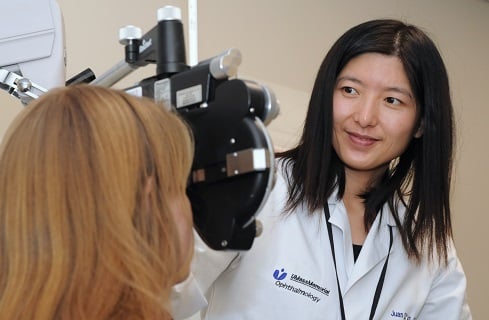Berkman Diabetes Clinical Innovation Grant Awarded to Test Efficacy and Impact of an AI Diabetic Retinopathy Screening Program in Primary Care
Date Posted: Tuesday, January 03, 2023
The fourth annual Herman G. Berkman Diabetes Clinical Innovation Fund grant was awarded to optometrist Juan Ding, OD, PhD (above) and co-investigator James Ledwith, MD, assistant professor of Family Medicine and Community Health. They are implementing an artificial intelligence (AI) diabetic retinopathy screening program in Family Medicine clinics to identify eye disease and improve comprehensive care for people living with diabetes.
“Despite vast improvements in screening and treatment of diabetic retinopathy in previous years, it remains a leading cause of vision loss in the United States,” said Dr. Ding, Director of Optometry Service, UMass Eye Center. “Many people face barriers to accessing quality eye care, including income, transportation, and health insurance. It’s important to improve methods of screening for diabetic retinopathy and make it widely available.”
Recent studies have identified AI-based algorithms as promising tools for the screening and early identification of diabetic retinopathy to help those at-risk. UMass Memorial Health partnered with digital health company AEYE Health to test the diagnostic accuracy of a hand-held AI-assisted camera to be used by primary care physicians to screen at-risk individuals for retinal changes indicative of diabetic retinopathy.
 The Berkman Fund will support efficient retinal imaging at primary care locations and the program will analyze the impact of offering primary care screening and its sustainability. "Many of our practices only have completion rates of 30-40% for the annual retinopathy exam, reaching 60% in a few well-resourced sites," said Dr. Ledwith. "Many factors contribute to this, however, we expect performing the initial screening during a routine primary care visits to greatly improve screening rates and early disease detection."
The Berkman Fund will support efficient retinal imaging at primary care locations and the program will analyze the impact of offering primary care screening and its sustainability. "Many of our practices only have completion rates of 30-40% for the annual retinopathy exam, reaching 60% in a few well-resourced sites," said Dr. Ledwith. "Many factors contribute to this, however, we expect performing the initial screening during a routine primary care visits to greatly improve screening rates and early disease detection."
The current screening process requires primary care physicians to refer all of their patients to an eye doctor for an annual eye exam. During this pilot program, people with diabetes who visit their primary care physician or nurse practitioner at UMass Memorial HealthAlliance Fitchburg Family Practice may be screened for retinopathy by a medical assistant or resident using an AI-assisted retinal camera. Retinal images of each eye are immediately uploaded to a cloud-based service that provides a report to the physician within a minute. If necessary, the patient can be referred to Dr. Ding or one of her colleagues at the UMass Memorial Eye Center for further evaluation.
“This technology may also be offered to patients within the Diabetes Center of Excellence to screen for eye disease so we can address it immediately,” said Dr. Ding.
Previous Berkman Fund Recipients
The GOOD-ER Program
This randomized clinical trial provided continuous glucose monitors (CGM) to people with diabetes who were currently not using one and arrived at the Emergency Room with high or low blood sugar, or other diabetes related complications. The recently completed study, led by endocrinologist Dr. Mark O’Connor and emergency physician Dr. Laurel O'Connor, is analyzing whether CGM successfully keeps people from returning to the ER with diabetes-related issues, compared to the control group who do not wear a device to monitor their blood sugars.
Improving Inpatient Blood Glucose Management
This project is implementing a carbohydrate counting system for hospitalized inpatients with diabetes throughout the UMass Memorial Health system. The study led by endocrinologists Dr. Leslie Domalik and Dr. Asem Ali, will evaluate if adopting a flexible meal dosing option based on carb counting, improves the outcomes of hospitalized patients with diabetes. The program will coordinate appropriate timing of blood glucose testing, insulin dosing, and administration of rapid-acting mealtime insulin. It will also ensure carbohydrate counts are listed for all food served to hospitalized patients, and better coordinate insulin delivery with meal delivery.
Identifying Diabetes Patients and Leveraging Underutilized Services to improve Care’ (ID PLUS Care)
This project led by Daniel Amante PhD and Adarsha Bajracharya, MD focused on a multidisciplinary, collaborative approach to improve care access, quality, and management for at-risk patients with diabetes. They monitored Electronic Health Record data to identify UMass Medicare Accountable Care Organization patients at risk for negative outcomes and proactively contacts patients to nudge them towards recommended services. It led to Dr. Amante receiving a three-year KL2 Mentored Career Development Training grant to develop a Diabetes Mellitus program using Behavioral economics to Optimize Outreach and Self-management support with Technology (DM-BOOST).
